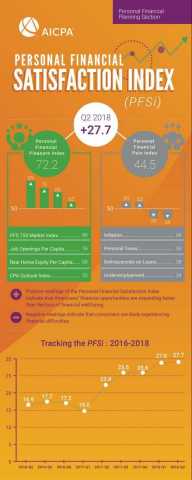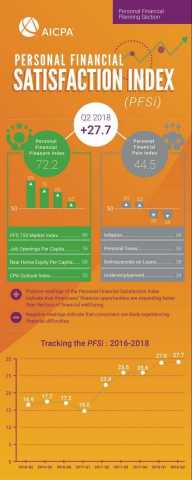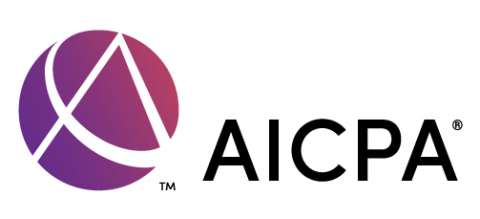NEW YORK--(BUSINESS WIRE)--Americans continue to experience their highest levels of personal financial satisfaction despite a rising interest rate environment, according to the AICPA’s Q2 2018 Personal Financial Satisfaction Index (PFSi). Personal financial satisfaction was buoyed by a record number of job openings and a rebounded stock market. The second quarter 2018 PFSi measured 27.7, a new all-time high for the index representing a 0.7 point (2.6 percent) increase from the prior quarter. This positive reading indicates that the average American should be feeling a strong sense of financial well-being.
The Q2 2018 Personal Financial Pleasure Index measures 72.2, a 2.8 point (4.0 percent) increase over the prior quarter. This gain establishes a new all-time high for the Pleasure index. The most notable improvement is in job openings per capita which increased 5.9 points (11.0 percent) over the last quarter to 76, a new record high. Overall job openings set records in the second quarter, with almost 6.7 million openings in April. The number of job openings increased in professional and business services, trade, transportation, warehousing, utilities and several other industries. In May, the most American workers in 17 years quit their jobs, indicating strength in the job markets as more people appear confident they can find a new job elsewhere, possibly at higher pay.
“A great job market is the perfect time for Americans to shore up their emergency fund, double check they’re making the most of their work benefits, and even consider shopping around to see if there is a better financial opportunity in their field,” said Kelley Long, CPA/PFS, member of the AICPA’s Consumer Financial Education Advocates. “In these times of increased market volatility, the best thing to do is stay the course, unless you’re near retirement. If that’s the case, then now is a great time to rebalance your portfolio to ensure you have adequate cash set aside, so that when the market does inevitably take a downturn, your retirement plans aren’t affected.”
After declining last quarter for the first time since Q3 2015, the PFS 750 Market Index rebounded 4.3 points (5.2 percent) from its Q1 2018 level to 89 and has once again reached an all-time high. It remains the leading contributor to the Pleasure Index as well as the PFSi overall. This AICPA proprietary stock index is comprised of the 750 largest companies trading on the US Market adjusted for inflation and per capita. In Q2, information technology led performance, followed by consumer discretionary and health care, whereas real estate and telecom delivered losses. According to Fidelity Investments, the sturdy domestic economy bolstered US stocks in Q2, especially small caps and REITs, which are less exposed to global trends and trade risk. However, the market remained extremely volatile in the second quarter.
The blended inflation measure for Q2 is 2.3 percent, an additional 0.6 percent higher than the prior quarter. This is above the Federal Reserve’s 2 percent target for inflation. The increase was largely due to the price of gas, medical care, consumer goods and housing going up, as measured by the Bureau of Labor Statistics. Inflation is the most volatile factor contributing to the PFSi, and with absolute levels still low by historical standards, small changes result in large percent gains. In terms of the index, the blended inflation measure value for Q2 is 54, an increase of 13.8 points (34.5 percent) from Q1. With the significant increase, inflation is now the leading contributor to the Personal Financial Pain index, narrowly overtaking taxes which held the distinction for 8 consecutive quarters. Thanks largely to inflation climbing to a 6-year high, the Personal Financial Pain Index measured 44.5 for Q2 2018, a 2.1 point (4.9 percent) increase from the prior quarter.
“With inflation surging to a 6 year high, this could signal the end of its historical lows,” said Michael Velazquez, CPA/PFS, member of the AICPA’s Personal Financial Planning Executive Committee. “Given inflation’s unpredictability, Americans should revisit the inflation assumptions used in their financial plans, especially if in, or close to, retirement.”
The tax component of the Pain Index is particularly important when measuring financial satisfaction because it is a distinct factor that many Americans recognize. This is the second quarter to reflect the impact of the Tax Cuts and Jobs Act. Even though the pain from taxes declined 1.3 points (2.5 percent) from the prior quarter, they are only 0.5 points (0.9 percent) below the year-ago level, before the new tax law was signed into effect. The personal taxes value uses information from the Bureau of Labor Statistics on income tax, tax on realized net capital gains and taxes on personal property.
Additional Findings from the Q2 2018 PFSi:
- The AICPA CPA Outlook Index, which captures the expectations of CPA executives in the year ahead for their companies and the U.S. economy, retreated 1.8 points (3.3 percent) below the previous quarter. By region, organization optimism was strongest in the South, where it increased from the Q1 level. This measure decreased everywhere else. The next strongest reading was in the Midwest, which had just a small decline. The weakest measure, and with the largest decline, was in the Northeast.
- The Real Home Equity per Capita Index, at 68, increased a steady 1.2 percent and is still 13.2 percent below its 2006 all-time high. The changes in value have been due to increases in the market value of real estate exceeding increases in mortgages outstanding.
- Underemployment is 7.6 percent, down 8.6 percent from the Q1 2018 level. In comparison, its peak value was 17.1 percent in the fourth quarter of 2009. Unemployment decreased in almost all industrial sectors over the last year.
- Delinquencies on Loans Q2 level is 2.5 percent below the previous quarter’s level. The improvements quarterly are mainly due to overall bank loans. Though the Q2 reading of delinquencies on mortgages (3.49 percent) is well below the peak delinquency rate for mortgages (11.26 percent) set in the spring of 2010, it is still above what was typical between 1994 through 2003 (2.12 percent).
Additional information on the PFSi can be found at: www.aicpa.org/PFSi.
Personal Financial Satisfaction Index Methodology
The Personal Financial Satisfaction Index (PFSi) is the result of two component sub-indexes. It is calculated as the difference between the Personal Financial Pleasure Index and the Personal Financial Pain Index. These are comprised of four equally weighted factors, each of which measure the growth of assets and opportunities, in the case of the Pleasure Index, and the erosion of assets and opportunities, in the case of the Pain Index.
About the AICPA’s PFP Division
The AICPA’s Personal Financial Planning (PFP) Section is the premier provider of information, tools, advocacy, and guidance for CPAs who specialize in providing estate, tax, retirement, risk management, and investment planning advice to individuals, families, and business owners. The primary objective of the PFP Section is to support its members by providing resources that enable them to perform valuable PFP services in the highest professional manner.
CPA financial planners are held to the highest ethical standards and are uniquely able to integrate their extensive knowledge of tax and business planning with all areas of personal financial planning to provide objective and comprehensive guidance for their clients. The AICPA offers the Personal Financial Specialist (PFS) credential exclusively to CPAs who have demonstrated their expertise in personal financial planning through testing, experience and learning, enabling them to gain competence and confidence in PFP disciplines.
About the American Institute of CPAs
The American Institute of CPAs (AICPA) is the world’s largest member association representing the CPA profession, with more than 431,000 members in 137 countries and territories, and a history of serving the public interest since 1887. AICPA members represent many areas of practice, including business and industry, public practice, government, education and consulting. The AICPA sets ethical standards for its members and U.S. auditing standards for private companies, nonprofit organizations, federal, state and local governments. It develops and grades the Uniform CPA Examination, offers specialized credentials, builds the pipeline of future talent and drives professional competency development to advance the vitality, relevance and quality of the profession.
The AICPA maintains offices in New York, Washington, DC, Durham, NC, and Ewing, NJ.
Media representatives are invited to visit the AICPA Press Center at www.aicpa.org/press.
About the Association of International Certified Professional Accountants
The Association of International Certified Professional Accountants (the Association) is the most influential body of professional accountants, combining the strengths of the American Institute of CPAs (AICPA) and The Chartered Institute of Management Accountants (CIMA) to power opportunity, trust and prosperity for people, businesses and economies worldwide. It represents 667,000 members and students across 184 counties and territories in public and management accounting and advocates for the public interest and business sustainability on current and emerging issues. With broad reach, rigor and resources, the Association advances the reputation, employability and quality of CPAs, CGMAs and accounting and finance professionals globally.




